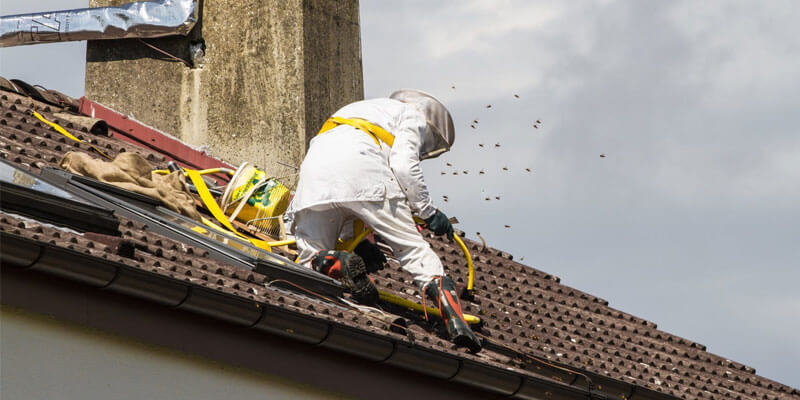About Bees
Bees sometimes make their way into homes while looking for a place to nest. The insects prefer dark and protected areas, so wall voids or chimneys often fit their needs. Any living space exposed to the outside is at risk for bee infestations. Some species that nest in wall voids fly inside the living space through baseboards, electrical outlets, and cracks in walls.

Problems due to Bees infestation:
1. Bee stings
They can produce different reactions, ranging from temporary pain and discomfort to a severe allergic reaction. Having one type of reaction doesn't mean you'll always have the same reaction every time you're stung or that the next reaction will necessarily be more severe.
- Most of the time, bee sting symptoms are minor and include:
- Instant, sharp burning pain at the sting site
- A red welt at the sting area
- Slight swelling around the sting area
Some people who get stung by a bee or other insect have a bit stronger reaction, with signs and symptoms such as: Extreme redness
- Swelling at the site of the sting that gradually enlarges over the next day or two
2. Severe allergic reaction
A severe allergic reaction (anaphylaxis) to bee stings is potentially life-threatening and requires emergency treatment. A small percentage of people who are stung by a bee or other insect quickly develop anaphylaxis. Signs and symptoms of anaphylaxis include:
• Skin reactions, including hives and itching, and flushed or pale skin
• Difficulty breathing
• Swelling of the throat and tongue
• A weak, rapid pulse
• Nausea, vomiting, or diarrhea
• Dizziness or fainting
• Loss of consciousness
3. Bees are aggressive
The fighting bees release an alarm pheromone—an odor that warns other bees of the danger. The alarm pheromone makes other honey bees aggressive, and more fighting means more pheromone is released which means more bees join the fray. The situation can escalate quickly.
4. They built colonies in residential places:
Bees sometimes make their way into homes while looking for a place to nest. The insects prefer dark and protected areas, so wall voids or chimneys often fit their needs. Any living space exposed to the outside is at risk for bee infestations. Some species that nest in wall voids fly inside the living space through baseboards, electrical outlets, and cracks in walls.
Our Services:
Contact
-
1-982-782-5297
1-982-125-6378 - info@xpertspestcontrol.com
Quick Enquiry
Xperts Pest Control Services Gets Rid of Bees
1. You See Bees & Wasps Everywhere
This one should be obvious. Sighting of bees and wasps in and around the residence is one of the initial signs of infestation. If you see a lot of bees moving in and out of the house, know that there is a problem. If there are too many bees buzzing around in your sight, you must start checking for the hive. Do not forget to check on the inside of chimneys and attics in the residence.
2. Follow the Sound
A bunch of bees buzzing together has an evident and distinct noise. The same goes for wasps. Since these insects gnaw on wood as well, you shall hear them if you pay attention. Often, your auditory perception will lead you towards the wasp hive or beehive in or around the house.
3. Holes
In case your house is infested by carpenter bees, it is evident for you to find holes in hard plants near your residence. Another surefire way to know if there are bees and wasps in the house is to look out for sawdust. Observe if there is any sawdust fallout in your doors, windows, deck, boards, or rafters.
4. Active Hives
Lastly, when you spot an active beehive or wasp hive in or around your house, you can be sure that there is a bee infestation. Safe extermination of the beehive is required. You may call a wasp or bee-catcher though that profession is becoming rarer these days. Therefore, after zeroing in on the best pest inspection, take the help of an expert pest control professional. If you are experiencing high numbers of wasps (yellow jackets) in your home or garden there is likely to be a nest nearby, either on your property, in your garden, or very close by. It is best to treat a nest earlier before numbers increase and the wasps become more aggressive. This will help to reduce the threat of a wasp sting, which can be very painful and even cause an allergic reaction. Also, you will need to keep away from the nest.
Get Professional Termites Pest Control Help
We here in XPCS follow the standard process for controlling the bees and their colonies in all areas of your properties. We follow underfollowing methods to avoid bee infestation:
1. Soapy Water Spray
1. It is needed to repay the hive several times over a week or two (sometimes longer).
2. Our technician wear protective gear to avoid getting stung.
Bees are most active during the day, so the best time to spray is at night when they are dormant.
2. Knock Down the Hive
3. Use of Insecticides
4. Smoke the Hive
Bee Control FAQ's
The first pest control service in the country by keeping abreast of the latest developments and use only those chemicals which are approved by WHOPES and EPA.
2. Follow the Sound
3. Holes
4. Active Hives
2. Do not scream, flap your arms or swat them
3. Avoid strong, sweet smells
4. Cover food and drink
